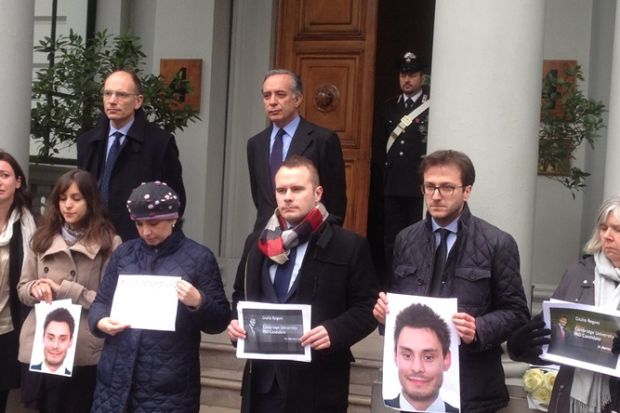Organisers of a vigil for murdered PhD student Giulio Regeni have called on the UK government to lend its support to ensure that a full “credible investigation” is carried out.
At the vigil outside the Italian Embassy in London, more than 60 people – many bearing white roses – gathered to hear former colleagues and friends pay tribute to the University of Cambridge doctoral candidate on the same day that his funeral took place in Italy.
Mr Regeni, who had been living in Egypt since September carrying out research on labour rights, was found dead in the suburbs of Cairo last week. His body had bruises, knife wounds and cigarette burns that suggested he had been tortured before being killed.
Pasquale Terracciano, the Italian ambassador to the UK, told the audience that he expected the “full truth [to] be established”.
“Everyone in Italy was deeply shocked by this heinous killing, and we expect the truth to be established and full justice [granted] to his memory,” he said.
Hannah Waddilove, a former colleague of Mr Regeni and a doctoral candidate at the University of Warwick, has organised a petition asking for the UK government to ensure that a reliable investigation is conducted. She said that Mr Regeni’s close ties to the UK were a good enough reason for the government to assist.
“Giulio lived in the UK for 10 years, he did all of his tertiary education here,” Ms Waddilove said. “He was in Cairo…conducting his PhD research. We feel that the UK government should be paying attention to this.”
Paz Zárate, one of the organisers of the memorial and a former colleague of Mr Regeni at thinktank Oxford Analytica, called him an “extraordinary young man” who “we want to remember…as someone who built bridges between countries and cultures”.
Speaking to Times Higher Education after the event, Ms Zárate said “it is justified the UK takes an interest”.
“At the moment of the killing, he was performing doctoral research at Cambridge University, and we think that what he and his family have gone through is also an attack on the values of education,” she said. “Researchers from all fields feel [this is] an attack [on them] and [will] feel danger if they go to certain locations to do their job.
“There’s a lot of solidarity, and…we think there is justification for the UK joining Italy in demanding a credible investigation of the murder.”
Angelo Martelli, another organiser of the vigil and a PhD candidate at the London School of Economics, told the audience that “academia has been assassinated”.
“What I think is extremely important is that we honour him by showing what he has done with his life and work,” he told THE.
“He was always trying to build these bridges across cultures, across countries…It is important that no walls are now being built, that we don’t just retrench within our national borders and start pointing fingers because this will go against what Giulio was actually working for during his life,” he added.
“As researchers, we don’t see any geographic borders or any borders based on ethnicity, religion. We are, in a way, researchers of the world.”




